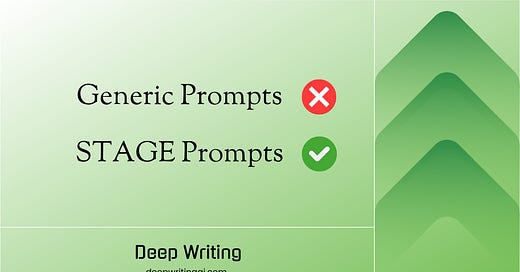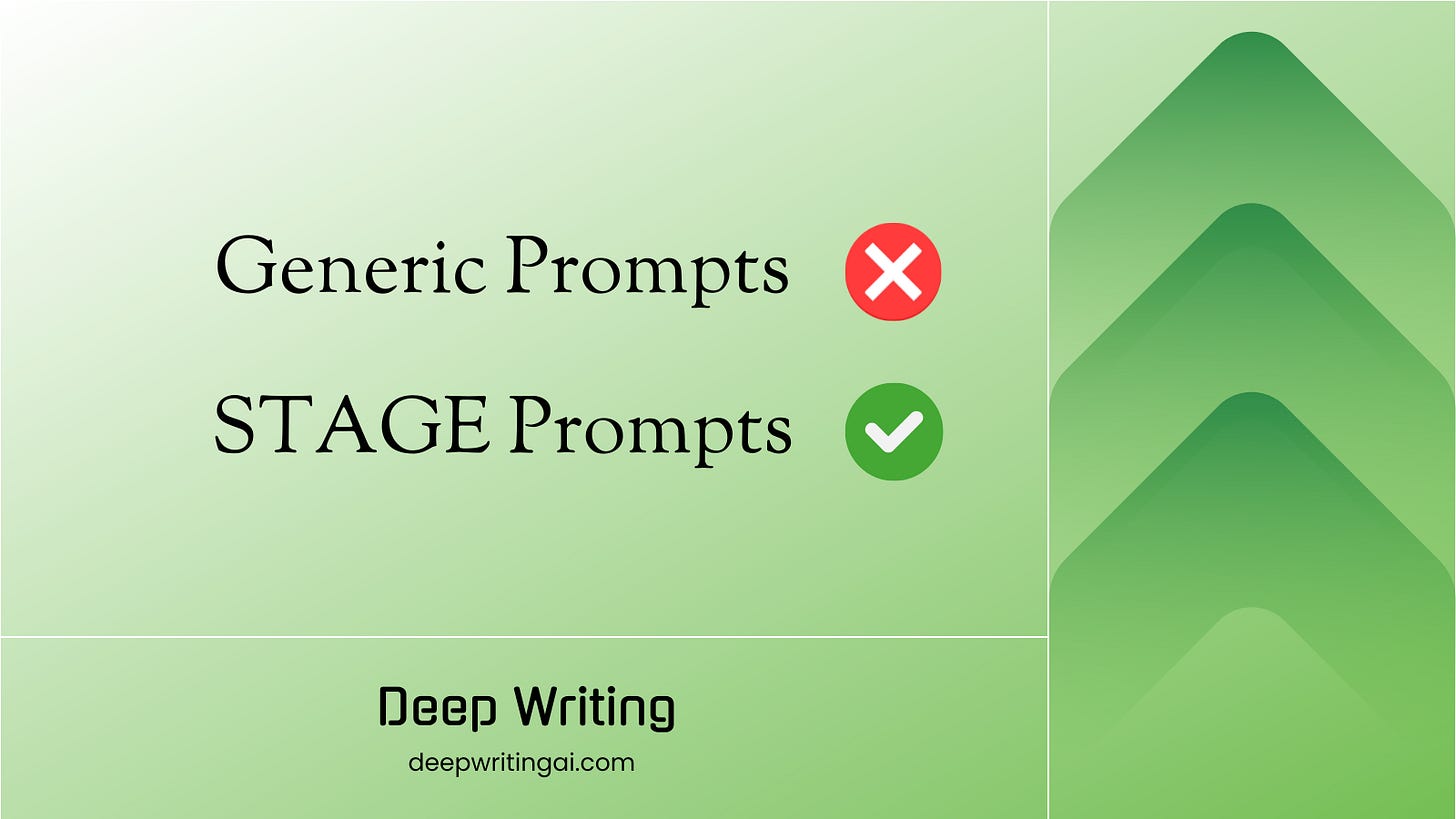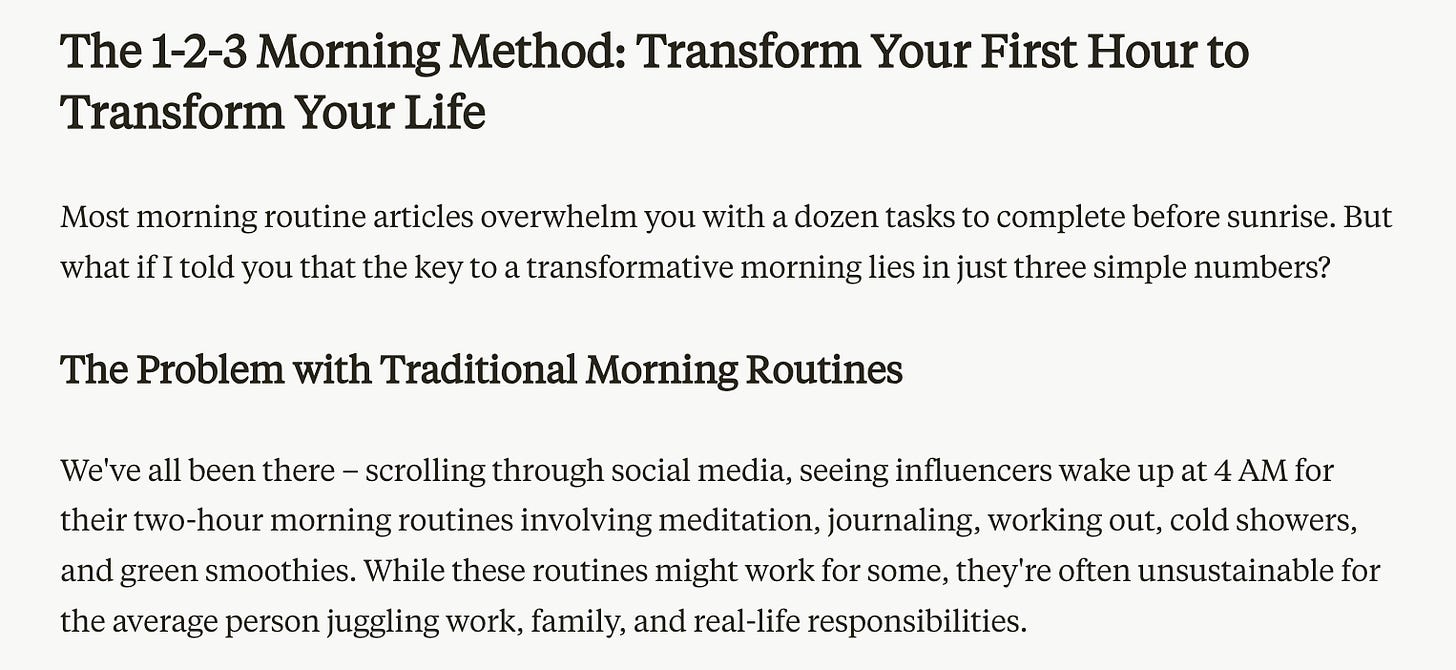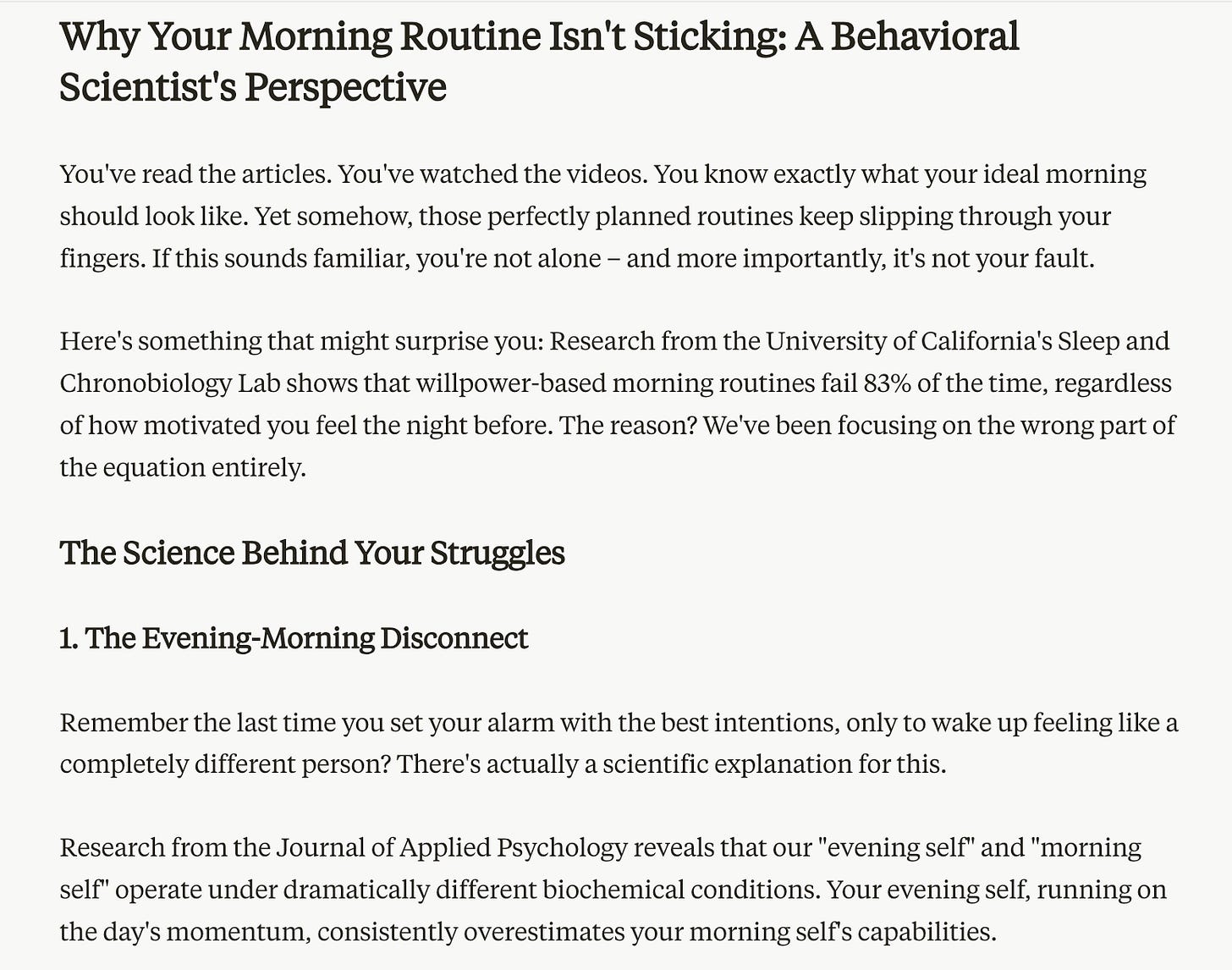How to Craft AI Prompts That Actually Work: The STAGE Framework
Stop wrestling with AI responses and start getting consistent, high-quality outputs
Welcome to the depths, Deep Writers.
Many writers approach language models like Google.
They type commands, expect perfect results, and get frustrated when it fails.
“Give me information about...”
“List the top trends in...”
“Tell me about the impact of...”
This approach fails because it fundamentally misunderstands how language models work.
By the end of this edition, you’ll know:
why AI responds the way it does
how to structure your requests for the best results.
LLMs Want to Generate Text, Not Solve Your Problems
Language models aren’t problem-solving machines. They’re essentially the world’s most sophisticated autocomplete systems.
Think about your phone’s text prediction feature. When you type “I will be”, it suggests words like “there” or “home”.
It’s making a guess based on common patterns.
Language models do the same thing, just at a massive scale.
When you write: “The biggest challenge remote workers face is...”
The AI isn’t searching a database for remote work research. Instead, it’s asking itself: “Based on all the text I’ve seen, what words typically come next?”
It might calculate:
“isolation” (5.2% probability)
“maintaining” (4.1% probability)
[dozens of other possibilities]
It picks one of the most probable words, adds it to the sequence, and repeats the process. Word by word, always asking “what comes next?”
This is why command-style prompts often fail. When you write “Give me information about climate change”, the LLM is simply continuing the text in the most probable way based on similar patterns it’s seen before.
Let’s see exactly how to structure the prompts for maximum effect.
The STAGE Framework
Starting Point (Bad Prompt):
Give me an article idea on morning routine for my personal development blog.This prompt gives the model no specific direction to work with. Without any context or constraints, it will default to generating the most common patterns it’s seen—leading to generic, surface-level content that could've been written by anyone.
Let’s use the STAGE framework to build a powerful prompt.
Step 1: Specialist
This tells the model which expert to summon for the job.
To specify the expert, answer two questions:
You are … (who the expert is)
You have … (what do they specialize in)
You are a Behavioral psychologist.
You specialize in understanding habits, motivation, and behavior change.Step 2: Task
The specific task we want the expert to perform.
Help me develop an article that explains why most people fail to maintain morning routines and provide actionable solutions based on behavioral science research.Step 3: Arena
This is where you tell the expert the intended audience, what they already know, and to what depth the expert has to go to.
Who is going to read this?
What’s the reader’s journey?
What do they already know?
What are they struggling with?
What transformation do they seek?
My audience consists of working professionals (25-40 years old) who:
- Have tried and failed to maintain morning routines at least 2-3 times
- Are struggling with consistency despite understanding the importance
- Want to move from knowing what to do to actually doing it consistentlyStep 4: Guidelines
This is where you direct how the expert should approach the task.
How should the content be organized?
How should the content feel to the reader?
What specific components should be included?
Any specific formatting or technical needs?
Structure the article as follows:
- Open with a research-backed insight that challenges common morning routine advice
- Include 3-4 main failure points, each supported by behavioral science research
- For each failure point, provide a practical solution that can be implemented immediately
Maintain an encouraging, supportive tone that:
- Uses clear, jargon-free language
- Addresses the reader directly
- Acknowledges common struggles
Include:
- Real-world scenarios from everyday life
- Step-by-step breakdowns of concepts
- Reflection questions for readers
Format for readability:
- Paragraphs: 2-3 sentences max
- Include subheadings every 200 words
- Use bullet points for listsStep 5: Exclusions
What topics, approaches, or ideas should be avoided?
Avoid:
- Generic motivational advice ("just do it", "believe in yourself")
- Extreme examples of CEOs or athletes with unrealistic routines
- Discussion of specific apps or productsLet’s bring everything together to see what we get:
You are a Behavioral psychologist.
You specialize in understanding habits, motivation, and behavior change.
Help me develop an article that explains why most people fail to maintain morning routines and provide actionable solutions based on behavioral science research.
My audience consists of working professionals (25-40 years old) who:
- Have tried and failed to maintain morning routines at least 2-3 times
- Are struggling with consistency despite understanding the importance
- Want to move from knowing what to do to actually doing it consistently
Structure the article as follows:
- Open with a research-backed insight that challenges common morning routine advice
- Include 3-4 main failure points, each supported by behavioral science research
- For each failure point, provide a practical solution that can be implemented immediately
Maintain an encouraging, supportive tone that:
- Uses clear, jargon-free language
- Addresses the reader directly
- Acknowledges common struggles
Include:
- Real-world scenarios from everyday life
- Step-by-step breakdowns of concepts
- Reflection questions for readers
Format for readability:
- Paragraphs: 2-3 sentences max
- Include subheadings every 200 words
- Use bullet points for listsHere’s what Claude produced:
The output is far better than what we started with.
Quick Tips:
Begin with one or two elements and build up
Keep a collection of prompts that worked well
Your first STAGE prompt doesn't need to be perfect. Iterate.
Try This Now
Pick a writing project you're currently working on
Write two prompts:
Your usual approach
Using the STAGE framework
Compare the outputs
Want personalized help implementing AI in your writing process?
I offer 90-minute sessions where we build your custom AI content system together.







